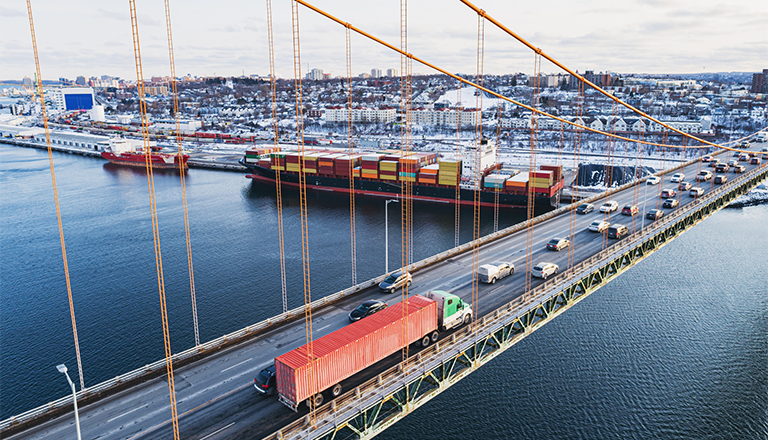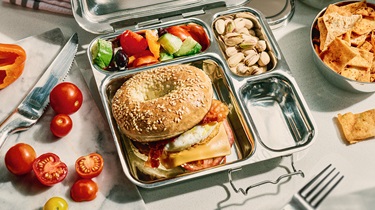
Incoterms 2020: Understanding the Group D and FOB rules
Author details
Emiliano Introcaso, CITP
Advisor & senior product operations manager
This is the last article in a four-part series on Incoterms 2020, the universal trade terms used in sales contracts worldwide to prevent misunderstandings between buyers and sellers. Today, we take a closer look at four rules pertaining to the delivery of goods.
When selling your products internationally, you’ll likely come in contact with many different languages and business cultures. That’s where Incoterms can help. When used correctly in your export contracts, you and your buyer share a universal logistics vocabulary that helps reduce the risk of misunderstandings and potential disputes.
In today’s blog, I’ll talk about the three rules that make up Group D and the free on board (FOB) rule, which I purposely left to the end of this series because it’s the most commonly misused shipping term.
Understanding DAP, DPU and DDP
The rules in Group D apply to any mode of transport. For each rule, the seller is responsible for all costs and risks of loss or damage to the goods until they’ve been delivered to the buyer. The main differences between the rules in this group relate to the payment of import duties and unloading costs.
The three rules that make up Group D are:
1. Delivered at place (DAP)
2. Delivered at place unloaded (DPU)
3. Delivered duty paid (DDP)
As the exporter, your responsibilities under DAP include:
- paying the cost of carriage of the goods to the destination;
- delivering the goods to the buyer at the named place of destination ready for unloading on the date agreed to with the buyer;
- clearing the goods for export;
- paying any duties, taxes and other costs related to export; and
- helping the buyer obtain any documents or information needed for import clearance.
You should also check out
Expand your understanding of the 11 universal trade terms used in global sales contracts and how they impact your business operations.
The DPU rule is identical to DAP with one exception: Under DAP, the seller delivers the goods ready for unloading, whereas under DPU, the seller has the additional responsibility of unloading the goods from the means of transport and then delivering them to the buyer at the agreed destination on the agreed date. DPU is unique in that it’s the only one of the 11 Incoterms rules in which the goods are unloaded by the seller at their destination.
The third rule in Group D is delivery duty paid (DDP). As with DAP, under DDP you’re required as the exporter to deliver the goods ready for unloading to the agreed destination on the agreed date.
The key difference with DDP is that you also have to clear the goods not just for export, but for import, as well. This means paying any duties for both export and import and carrying out and paying for all customs formalities such as the export licence, security clearances and pre-shipment inspection.
If you’re an e-commerce exporter you might want to use DDP pricing to ensure B2C (business-to-customer) transactions are cleared by customs prior to arriving to the consignee of your products, and the prices listed on your website should include all duties and taxes based on the import country.
Understanding the FOB rule
Unlike the Group D rules, free on board (FOB) is one of four Incoterms that only applies when you’re shipping your products by sea or inland waterway. If you’re using other means of transport for your products, the FOB rule doesn’t apply to your export contract.
As the exporter, your responsibilities under FOB include:
- delivering the goods by placing them onboard the ship chosen by the buyer at the port agreed to with the buyer at a specific date and time;
- clearing the goods for export; and
- helping the buyer obtain any documents or information they need for import clearance.
As the exporter, you’re responsible for paying all costs related to the goods until they’ve been loaded onto the ship. It’s at this point that the risk of loss or damage to the goods passes from the seller to the buyer, and the buyer is then responsible for any subsequent costs. This is one of the most commonly misused Incoterms when shipping into the Unites. I kept the below list short to ensure that when it comes to FOB, you should never use it if:
- shipping involves a truck-only route;
- associated with a port of arrival; or
- used as a replacement of “Freight on Board” since this term isn’t an Incoterm.
You should also check out
Keep track of the international markets that matter to your business. Get the latest financial and macroeconomic information for both developed and emerging markets.
Who’s responsible for the loss?
A Canadian exporter of medical devices based in Vancouver, BC has an agreement to sell a full container of personal protective equipment (PPE) and mechanical ventilators to a buyer in East Asia. The contract with the buyer includes the term “FOB Port of Vancouver, British Columbia Incoterms 2020.” While loading the goods onto the ship at the Port of Vancouver, the crane operator places the shipment onto the deck of the ship and right after, the crane collapses and all the equipment is destroyed.
Is the buyer or the seller responsible for the losses associated with this accident?
In this case, it’s the buyer’s loss. While it could be argued that the crane operator caused the damage to the equipment and that this error occurred before delivery, the actual damage to the equipment occurred while it was onboard the ship. The cause of the damage occurred at the port before FOB delivery, but the damage to the goods occurs after the goods are onboard. In an FOB transaction, any losses that occur after the goods are onboard the vessel are the buyer’s responsibility.
For more information about all 11 Incoterms, see the official Incoterms 2020 rules and remember that when drafting and negotiating a contract, you should always review each rule in detail.
You should also consider Incoterms 2020 training for a member of your staff, presented by the Forum for International Trade Training (FITT) and the Canadian Chamber of Commerce (CCC). The course is designed to help international trade professionals gain an understanding of the latest edition of the Incoterms rules.
This four-part series was developed by Emiliano Introcaso, export advisor and senior product operations manager for Knowledge Business at Export Development Canada and a registered trainer with the International Chamber of Commerce (ICC) on Incoterms 2020 in Canada. He’s also a Certified International Trade Professional (CITP) awarded from the Forum for International Trade Training (FITT).
If you have any further questions, visit our Export Help Hub for more resources.
Continue series

Part 1 of 4 in series
Incoterms 2020: Understanding the Ex Works rule
Continue seriesPart 2 of 4 in series
Incoterms 2020: Understanding the FCA rulePart 3 of 4 in series
Incoterms 2020: Understanding the Group C rules

















